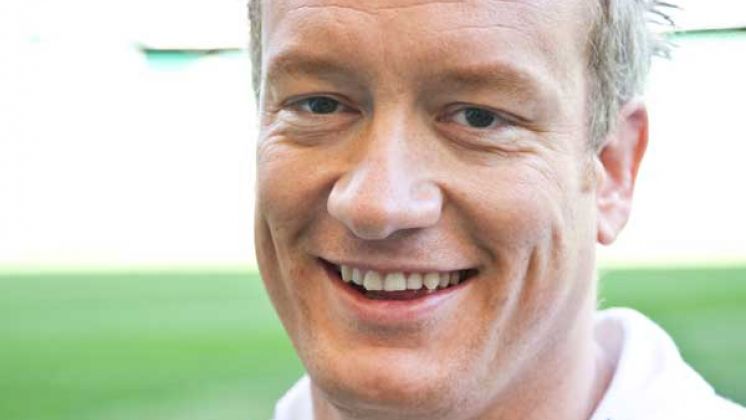
The Lions will be playing three extremely intense, highly physical test matches, with only a week’s rest between each game. How will you build their fitness to cope with that high workload?
With the coaching crew we’ve got every session will be intense, so we’ll be training above match intensity all the time in pockets during the week. Then obviously there’s a massive premium placed on recovery and nutrition after games and between training sessions so the lads are ready for the matches at the weekend. There’s a lot of travel involved too which will lead to travel fatigue. That’s something else we have to try to get over.
How important is the work you do in the gym to prepare them for the physicality of the matches?
We’ve got some big, strong explosive boys but we won’t be looking to make big gains in strength in the gym. We’ll just be getting them ready for the matches. They’ll probably have three big gym sessions each week: a whole-body strength session first, then an upper-body strength session in the middle of the week, and finishing with a power-orientated session two days before match day. That last session will involve a lot of explosive work, such as power cleans and high pulls, and sprinting drills that act as a primer for the match.
What’s the most important physical asset the Lions team will possess – speed, endurance, power? And how will they achieve this?
The Lions squad will have the best players from every individual team, so the game becomes faster by default. Everyone’s executing the skills faster, so the game will always be 10-15% more intense than a normal domestic game. If you lack something in any one area then you’re going to get found out. If you’re really strong but not fit then you’ll be struggling 20 minutes into the game. So we’d like to think that all of our players possess all of those qualities in abundance. But, strength and power-wise especially, we need to be doing plenty of strength because Australia are an explosive, strong team and we need to try and win the game.
Where do you expect the match to be won and lost?
The battle in the forwards is going to be massive. Our forwards are always pushing maximum strength work because that is their game. We also need to be able to repeat what we do over and over again during the game. The last 20 minutes of the game will be key. With England we push for this so we can finish strongly in matches, and I know that the Welsh side do too. The endurance focus is big as well. It’s about being able to repeat what you do – tackle someone, get up off the floor, hit the scrum, hit a ruck, go again. You’ve got to be able to do that over and over again for 80 minutes.
Rugby is obviously very stop-start, and recovery is vital, so what are the best fitness drills to prepare the players for this stop-start nature?
You’ve got to train as specifically as you can for the game. So, your training will involve a lot of running, a lot of getting up off the floor, a lot of pushing movements and pulling movements. Our training is very interval based. We’ll work at a 1:1 ratio of work to rest. This is one of our shuttle drills: run five metres, hit the floor and jump back up, run back five metres and do another down and up, run ten metres, do the same, then run 20 metres down and up, and then finish back at the start resting the same amount of time it took you to complete. Then we’ll repeat that a few times. We also do lots of wrestling drills. Three players work in a five-metre square. Two have 20 seconds to push each other out of the square. Then, they’ll rest for ten seconds before the next man is in and we’ll keep rotating. They will be working for 20 seconds and resting for ten. These drills replicate a match really well.
Are the players on a strict diet? What will they be eating and drinking before and after tough training sessions?
Nutrition has improved hugely over the past ten years in rugby. Unless you eat well you won’t get by these days. Two to three hours before training the boys eat protein-based meals with a bit of carbs to get them through the session, such as chicken with potatoes and plenty of veg for antioxidants and the occasional bit of bread but not too much. During training, the boys will be sipping on sports drinks. We use Maximuscle which has got some amino acids in it, some protein and some carbs. After training they’ll take a recovery shake depending on the nature of the session. If it’s a weights session it might just be a protein shake but, if it’s a heavy rugby training session, it will include some carbs to help drive the protein to their muscles for recovery. Then they will try to get another protein-based meal in within the hour.
Could you give our readers a mini workout based on what you will put the Lions players through?
Try this interval sprints session in the park or on a treadmill. Sprint for 30 seconds followed by 30 seconds’ rest for eight repetitions. Rest for a minute. Then sprint for 20 seconds with 20 seconds’ rest another eight times. Rest for another minute. Then finish with a ten-second sprint and ten seconds’ rest for ten reps. In total it should take less than 20 minutes.
What is your number one fitness tip?
You’ve got to be specific to what your needs are. Establish what your goal is and how you’re going to get there. There’s no hiding from it. If you don’t work hard, you wont make any gains. If you’re lifting, you’ve got to lift and you’ve got to be tired when you finish. It’s got to be intense. If you’re running or training for cardiovascular fitness, you’ve got to train hard. If you don’t try hard there’s no point to your training.
Paul Stridgeon was speaking at the Maximuscle rugby day, part of the Protein Project. Stridgeon has been helping the contestants achieve their goals. See their results and vote for your winner at facebook.com/maximuscle
For more exclusive interviews get the mag, subscribe now and we'll give you five issues for £5.
The new MF interactive iPad magazine is also out now. Click here to download it.
Get the Coach Newsletter
Sign up for workout ideas, training advice, reviews of the latest gear and more.

Sam Rider is an experienced freelance journalist, specialising in health, fitness and wellness. For over a decade he's reported on Olympic Games, CrossFit Games and World Cups, and quizzed luminaries of elite sport, nutrition and strength and conditioning. Sam is also a REPS level 3 qualified personal trainer, online coach and founder of Your Daily Fix. Sam is also Coach’s designated reviewer of massage guns and fitness mirrors.
